I was recently pointed to something I hadn’t seen before – a version of Dr. Charlie Nemeroff’s CV that had a listing of his tenure on the advisory boards of various pharmaceutical companies including time served on each. It adds another dimension to the compilation of his published articles and the GSK PsychNET Speaker trips [none of it…]. I converted the CV info into the table and graph below:
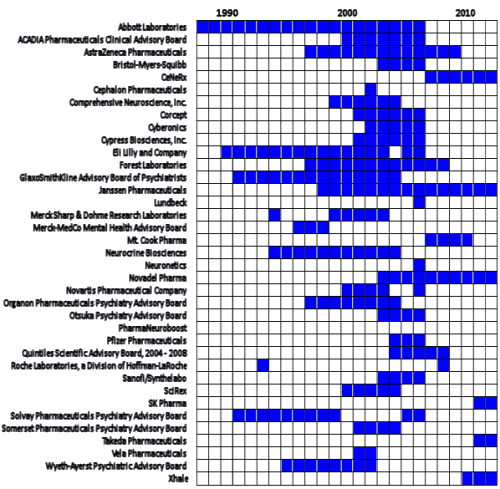
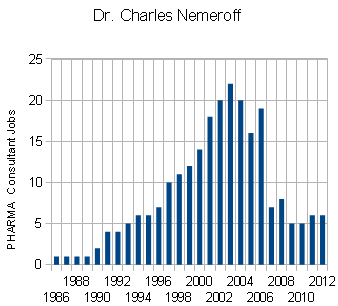
Like the speakers’ bureau revenue, the pay for these advisory positions went directly to Dr. Nemeroff, not the University. The sheer number of companies is overwhelming, maxing out at 22 companies in 2003, but there’s something else. The escalation begins at the same time he became chairman at Emory, and steadily rises until 2004 when Emory began to balk, and finally fell dramatically only after he lost the editorship of Neuropsychopharmacology in 2006 [undeclared conflicts of interest]. The point being that he parleyed his academic appointment into personal gain from the very start. Now add the GSK Speakers’ bureau trips from 2000-2005:
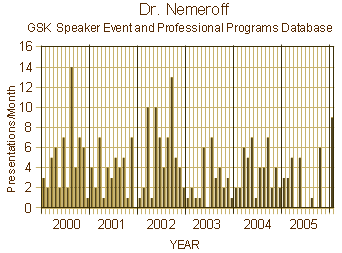
And his publications:
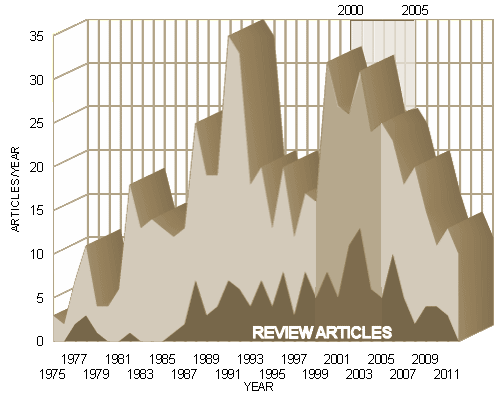
This is obviously not possible without assistance. It’s certainly not possible for meaningful scientific work to have been accomplished. And while his excesses are more apparent and better documented than most, he was hardly alone. He was just an extremely brazen version of a large cohort of peers…
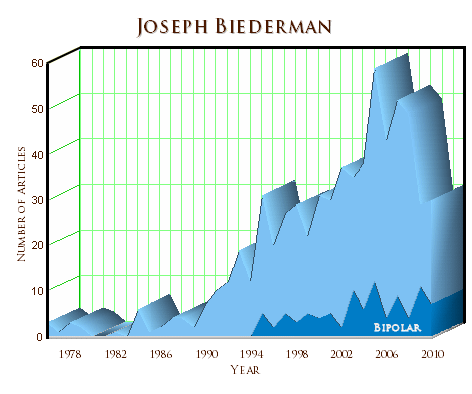


…just to mention a few. In these graphs, I’m unaware of any article that added much of note to the scientific record – no "classics." Were the papers all to evaporate, their absence would unlikely go noticed. And there are many more such psychiatric KOLs whose productivity graphs would be equally inflated and equally discardable [though I doubt anyone equalled Nemeroff’s industry paychecks]. All four were investigated for conflicts of interest by the US Senate. All four still hold academic positions and two have current NIMH Grants. Two were Departmental Chairmen – one still is. The other two were full professors in charge of large programs. All four have been authors on ghost-written articles.
Each of these psychiatrists have been a part of something that is manifestly unethical – using their position in academic medicine to further the financial ambition of the pharmaceutical industry – encouraging the use of specific products while ignoring their risks. Each has accepted pay of some sort for these services and hidden the personal gain from the academic institutions that employed them. Each has substituted massive numbers of publications for substantive contributions to the scientific literature. Each has adopted the lingo of science ["evidence based medicine"] while perverting its meaning. And each has been "busted," yet continues along the same path.
In previous posts I have described the crisis of medication development for mental disorders. Medications developed over the past five decades have been prescribed widely but have not been sufficient for reducing the morbidity and mortality of mental disorders. Yet there is diminishing activity in research and development for new medications within either the biotech or pharmaceutical industries. While the development of psychosocial interventions and devices, including the use of mobile technologies, is promising, the absence of a robust development pipeline for more effective medications would be worrisome in any area of medicine and should be a grave concern to the mental health community.
What can we do? Medication development is slow, expensive, and high risk. Indeed, the most recent data suggest that creating small molecule medications across disease areas is, on average, a 15 year endeavor that costs over $2 B and fails more than 95% of the time. No wonder that industry has reduced their investments. Can NIMH afford to invest its public funds in medication development? Can we afford not to?…Success will also be determined by how others get involved, from industry to the academic community to patient advocates. We will need public-private partnerships, clinical trial networks, and creation of a new “pre-competitive” culture to change the face of medication development and have more alternatives for people with mental illness.
With the pharmaceutical industry weary of investing in psychiatric drug development, collaboration across public and private sectors seems to be the only way to remedy a dearth of new treatments. Leaders from academia, government, the pharmaceutical industry, venture-capital firms, and clinicians met at APA headquarters March 8 to discuss the shrinking investment in new drug development for psychiatric disorders. The “Pipeline Summit” was organized and supported entirely by the American Psychiatric Foundation [APF] after APF was asked to convene the event by the leadership of the National Institute of Mental Health [NIMH] and National Institute on Drug Abuse [NIDA]. They are concerned that psychiatry is facing a prolonged drought of no new drugs for years to come. One by one, major pharmaceutical companies have slashed or abandoned neuropsychiatric research programs.There are huge unmet clinical needs in mental disorders and addiction,” said Jeffrey Lieberman, M.D., incoming president-elect of APA and chair of psychiatry at Columbia University, who moderated the morning session. “There should be tremendous interest in this area, but there is not.” Psychiatric research and development programs have gained a high-cost, high-risk, and no-return reputation in industry after dozens of failed programs, agreed senior managers from several major companies at the summit….
One of APF and APA’s roles, Schatzberg said, is to continue to fight the stigma against psychiatry and psychiatric drugs. In addition to facilitating more collaboration between the government and the private sector, he proposed that APF and APA work with other stakeholders to create incentives for industry to reinvest in psychiatry… “APA has a role in shaping what future psychiatric practice looks like,” Schatzberg stated. “More needs to be done now if we are to have new treatments in the next decade for patients with psychiatric disorders”…
It’s hard for me to imagine that this current generation of academic psychiatrists can transcend the climate that has dominated their careers – a climate characterized not by scientific achievement or discovery, but rather by success in garnering access to the money handed out by the booming psychopharmaceutical industry for their institutions, their faculties, or themselves. It’s a climate that has required a specialty-wide selective inattention to gross misbehavior unknown in previous generations. Now, a sizable amount of energy is being expended by the NIMH and the APA to try to keep the pharmaceutical industry in a game [that seems to have already about run its course]. The current DSM-5 effort is suffering a similar fate, beginning in an era that is already an anachronism only a few years later.
Psychiatry is currently approaching a crisis. Experience tells us that a crisis is precipitated when there is a situation that makes the current trajectory impossible. It is a time when change is inevitable, but the direction of change is never guaranteed. It can be a period when many old problems can be rectified while new directions can lead to great progress. It can also be a time where desperate solutions can lead to further decline and collapse. Sometimes, the solutions born in crisis are only temporary fixes, leading to even worse tangles down the line.
Getting governments to assume the risks, specifically legal liability, for drug development is also an explicit goal of the European College of Neuropsychopharmacology (ECNP), as voiced by David Nutt in this 2011 Guardian article http://www.guardian.co.uk/science/2011/jun/13/research-brain-disorders-under-threat?INTCMP=SRCH :
“”The issue that most comes up is about litigation — companies’ concern that they could be sued 30 years down the line if an adverse effect emerged. We’re thinking the ECNP could perhaps provide the insurance cover.””
Psychiatrists who depend on drug-development money for their livelihoods would want to burrow into the deepest pockets available. With pharma looking for greener pastures, sovereign treasuries are the natural alternative.
Welcome back, Mickey. Hope you caught lots of fish. No word yet from Senator Grassley??
We can see from your first chart that the major drug makers dropped Nemeroff after he was outed between 2004-2008 for undisclosed conflict of interest. These corporations may act foolishly at times vis à vis academic KOLs but they are not stupid. Only Janssen now seems unaware of how toxic Nemeroff is.
“…currently approaching a crisis”? You are either being too kind or just in the midst of vacation lag with that comment. Psychiatry has been in a crisis since letting managed care crush it like one of those monster truck rallies with our profession one of those discarded cars being pummeled.
Whores and cowards. That is our soon to be tombstone. DSM 5 the final nail of the coffin. Welcome back!
“Right now, we await further instruction…”
From whom? Anyone within the psychiatric profession with any “pull” is already swimming in Tom Insel’s Kool-Aid.
And while I agree with Joel that psychiatry is in crisis, I don’t think that managed care will be (or has been) its death knell. No, to the contrary, managed care will further enable the institution of “protocols” and “guidelines” (like TMAP and its ilk) that will further strengthen pharma’s dominance of our profession and its payers. The difference is, since such a strategy requires basically zero thought (and leaves no room for psychotherapy– what is that again???) it will be relegated to the cheapest providers available. “Psychiatry” will still live on, but it won’t be practiced by anyone with an MD or DO after their name.
here’s an observation from about 20 years of working in various community mental health settings in a few states: more and more of what comes in the doors of CMHCs is basically poverty, and the consequences we are being asked to medicate, not psychiatric disorders creating socioeconomic problems first barely being half the time now.
I don’t know anyone who comments here who is a clinician, but I know this, being pressed to treat symptoms is a tremendous waste of time, and when you meet people who are financially and socially indigent and give you history when they are more solvent in such aspects they do well, why the hell am I pressed by patients, nonpsychiatric providers, and administration to just write scripts like pez?! I’ll tell you my theory: easy and convenient always trumps right and perserverance any day of the week in this country of late!
I’m going to the end of my career remembering a simple adage taught early on in med school and reinforced by teachers and mentors since: treat the problem, not the symptom. You think any one in the APA or halls of academia can say with a straight face that adage now? All they say between the lines is “watch your wallet/purse, that’s the problem!”
I agree with Dr. Hassman’s post: my clinical experience has so far been essentially identical. Ditto my conclusions and ensuing general dismay. Contemporary psychiatric clinicians practicing in the trenches of the land of the free are faced with addressing individual/family issues that are not correlationally, but causally related to the massive culture/society-wide psychopathology, inequality, and other inconvenient truths. Remember the 3 Ps: Predisposing, Precipitating, and Perpetuating factors? The 4th and crucial P these days is extremely frequently “P†from “Povertyâ€.
Psychiatric clinicians are expected to deliver first-world outcomes/outputs with third-world, or worse, dystopian world, inputs. In this setting, clinicians often pretend to treat, patients “pretend†to get better, and society at large gets to pretend that “all is well, nothing to see here folks, move along.â€
The entire game is predicated upon the cultural/societal need that we, the subjects, be groomed to accept/tolerate/internalize the distortions and blatant lies and 3-card-monte games coming from “opinion leaders†and assorted clowns, swindlers, hustlers and other specimens. These days, the “patient†is very often not the beleaguered human being sitting in your office. He/she is merely the “identified†patient. The “sick man†is elsewhere.
But, as Rilke wrote, “For here there is no place that does not see you. You must change your life.â€